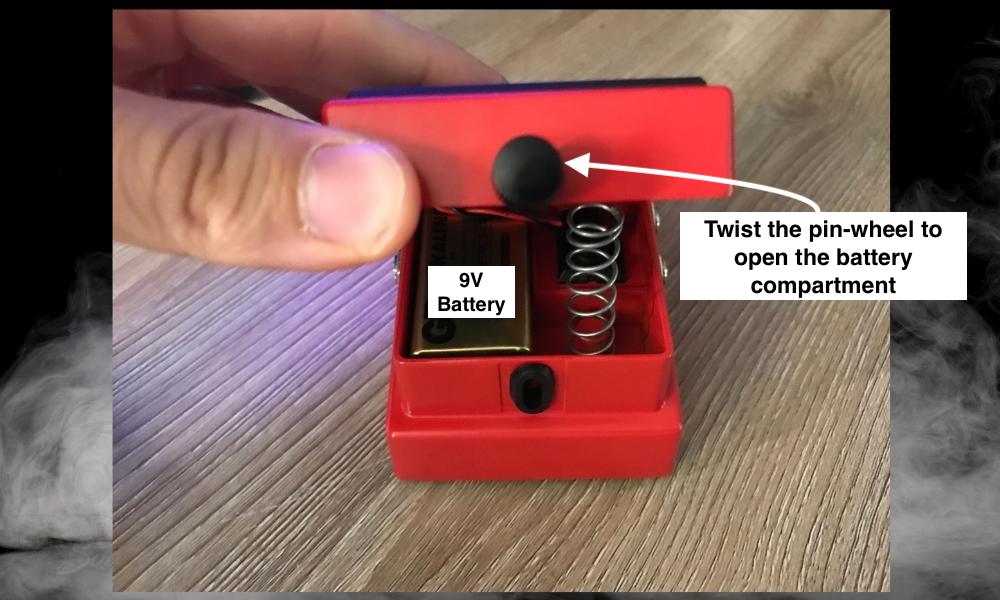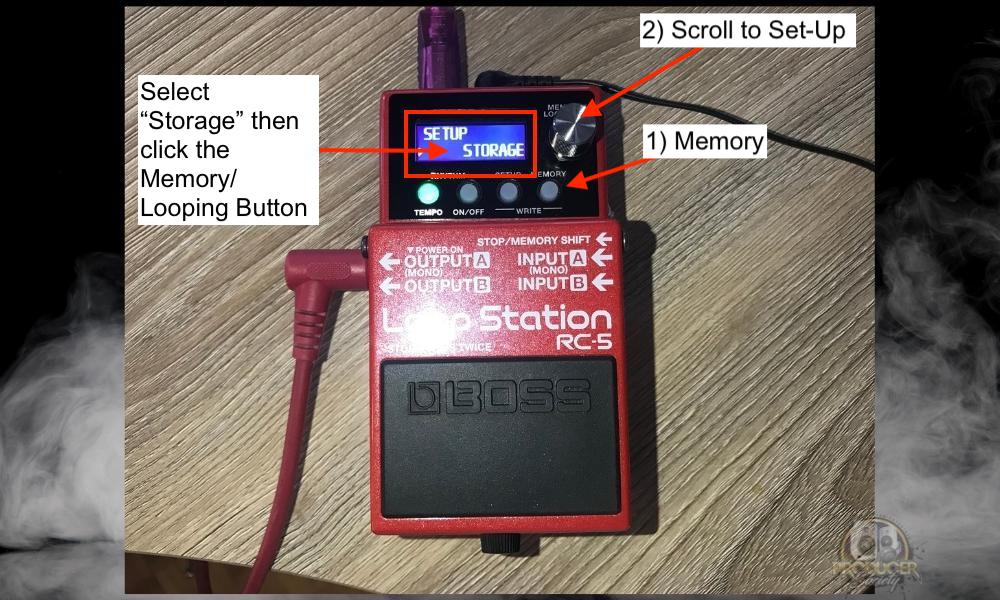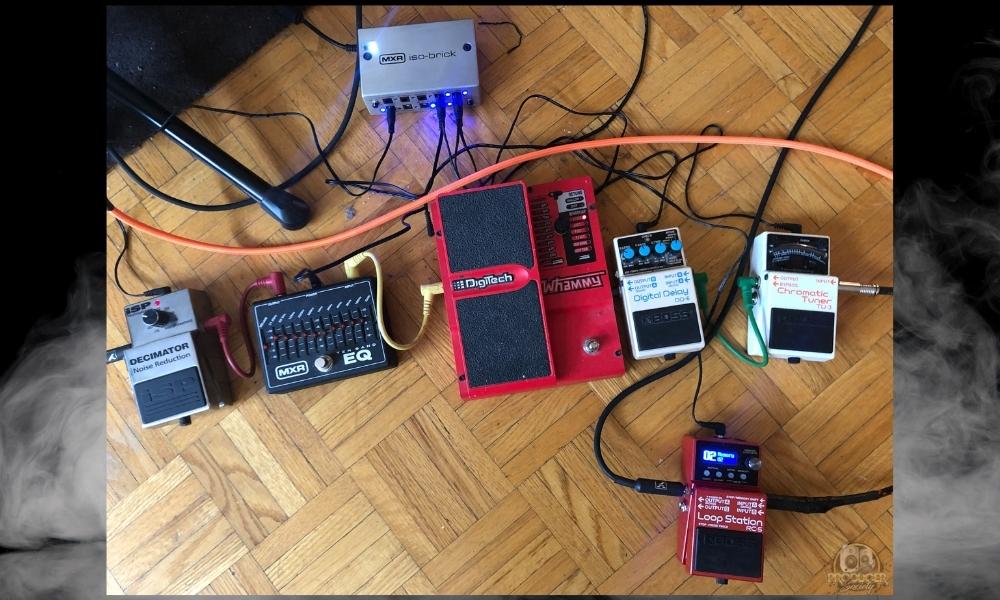if you’re familiar with guitar pedals, you’re probably aware that 9V batteries don’t really last for long. There are some pedals that last longer than others, for sure, but in the majority of cases, it’s rare for you to get more than 6-8 hours out of a 9V battery.
And the RC-1 is no different, although, it does last a bit longer than some of the other looper pedals because of the lack of the bright LED display that many of them have. I know this to be a fact because I’ve done two experiments, including one for the RC-1.
Typically, a 9V battery will power the BOSS RC-1 Loop Station for around 4.5 hours with continuous use. Despite the official BOSS/Roland Instruction Manual stating a lifespan of 3 hours, due to its 95mAh current draw, actual usage may extend to 4 hours or slightly more, depending on how it’s used.
This is one of the reasons why some people may prefer to use the RC-1 over the RC-5 which I also own. The RC-5 lasts only 1 hour and 45 minutes which is about half of the time of the RC-1. This means if you like busking or don’t have access to a power supply, the RC-1 may be a better option. Moving on, let’s talk a bit more about the experiment.
How Long Does A 9V Battery Last In the BOSS RC-1? – The Experiment
Current Draw of the BOSS RC-1 and What It Means
According to the official instruction manual from BOSS, the BOSS RC-1 will last 3 hours, but as I said a moment ago, it’s actually around 4 hours. So that’s good news if you care about this sort of thing.
Compared to the experiment that I did for the RC-5 which you can access here on the site and in my other YouTube video, the RC-1 lasts twice as long as the RC-5, and that’s simply because of their current draw relative to each other.
BOSS says the current draw of the RC-1 is 95 mAh compared to the RC-5 which is 170 mAh. As you can see, the RC-5 is a bit over half. In case you don’t know, a typical 9V battery is rated to supply approximately 300mAh.
So if the pedal has a 95mAh current draw, it’ll consume 95 milliamperes of power per hour. If you went by just the math, it makes sense that it would last for just 3 hours, however, as you’ll see in the section below, the empirical results were different.
There are a few reasons why the RC-1 has a much slower current draw than the RC-5 and we’ll talk about that in a moment. But for now, let’s talk about what I did for the experiment and then I’ll explain the results.
What I Did For The Experiment

For the experiment, I put a 9V Duracell battery into the RC-1 and then I connected the pedal to my mini-amplifier. Realistically, when you’re using a guitar pedal, with the exception of a noise gate, you usually don’t use it 100% of the time.
Because of this, I didn’t have the pedal on playback mode the entire time. I sometimes played with it and used the features, and sometimes I just left it plugged in while I jammed as I normally would.
Also, I didn’t use any other guitar pedals, and I didn’t turn off or disconnect the pedal from the unit once. As you can see from the first Youtube video I posted at the beginning of the article, I started the experiment at 12:15 pm exactly.
The Results
I played the guitar and had the pedal connected while powered on for exactly 4 hours before it finally died. I started the experiment at 12:15 pm and the pedal died right at 4:15 pm.
Interestingly, BOSS underestimated their own pedal which I think is worth mentioning because most manufacturers will actually exaggerate or overshoot their equipment’s capability and battery life. This wasn’t the case with the RC-1.
So why did the RC-1 last much longer than the RC-5 which I alluded to before? Well, there are a few reasons for this and of course, they’re all related to the current draw.
Why The BOSS RC-1’s Battery-Life Lasts As Long As It Does
![RC-1 vs RC-5 - How Long Does A Battery Last In The BOSS RC-1 [ANSWERED]](https://travelingguitarist.com/wp-content/uploads/2022/09/RC-1-vs-RC-5-How-Long-Does-A-Battery-Last-In-The-BOSS-RC-1-ANSWERED.jpg)
1) The RC-1 Doesn’t Have As Many Features

Simply put, the RC-1 has way fewer features than the RC-5. For one, the RC-5 has the ability to store 100s of loops and it also includes drum loops and other sounds.
You can also import and export sounds in and out of the BOSS RC-5 using your computer and a standard USB-B to USB-A cable, also known as a printer cable. Another feature the RC-5 has that the RC-1 does not is the reverse function.

These are just a few of the many features that the RC-5 has that the RC-1 doesn’t. My guide on how to use the RC-5 has a list of everything it can do, so make sure to check that out.
Saying all that though, fewer features, in my view, are not the main reason why the RC-1 lasts so much longer than the RC-5. The real reason has to do with the super colorful and bright display.
2) The BOSS RC-1 Loop Station’s Display Isn’t Very Bright
![LED Displays - How Long Does A Battery Last In The BOSS RC-1 [ANSWERED]](https://travelingguitarist.com/wp-content/uploads/2022/09/LED-Displays-How-Long-Does-A-Battery-Last-In-The-BOSS-RC-1-ANSWERED.jpg)
I think the biggest consumer of power is the super bright display of the BOSS RC-5. Its display is significantly more detailed and includes far more colours. It’s also quite a bit brighter too.
If you think of any electronics that you have, including an iPhone or really any smartphone for that matter, the brightness of the screen plays a huge role in how much power the device uses. Other than picking up on cell tower signals.
Yes, the RC-1 does have a display, and it does do a good job of communicating what the pedal does, but it isn’t as bright nor is it as colourful. So this plays a big role in how much energy the RC-1 soaks up.
3) How Much You Use It

And finally, how much you use the pedal obviously plays an important role in how long it lasts. If you have it on playback or overdub mode the entire time, it’ll probably take more power, but this isn’t a realistic situation.
As I said earlier, most people will switch the pedal on and off, depending on what they’re doing and what they’re using the pedal for. I know I use the pedal a lot, but I almost never have it switched on at every waking moment.
Other Articles You May Be Interested In
- What Do You Need To Use A Looper Pedal? [3 Things]
- Do Looper Pedals Work With Any Amp? [ANSWERED]
- How Long Does The Battery Last in the Boss RC-5 [ANSWERED]
- How To Connect The BOSS RC-5 To Your Computer [SIMPLE]
- How to Reset The BOSS Loop Station [5 Models]
Important Things To Note About 9V Batteries and The BOSS RC-1
1) It’s Possible Other Loopers Last Longer
I’ve really only used 3 looper pedals thus far: the RC-1, the RC-5, and the Clone Looper, although, I plan on using the TC Electronics Ditto Looper X2 at some point real soon.
The Ditto Looper doesn’t have a bright display at all, so I’m curious to see how long it lasts. The nice thing is that nearly all manufacturers tell you the current draw of their pedals, so you have at least a rough idea of how long it will last before you even try.
2) It’s Still Best to Use A Power Supply
While the battery life of the RC-1 is pretty good, using a power supply like the MXR Isobrick M238 is a much better option. Ensure you use the 9V ports and any port that’s above 100mAh.
A 9V battery cost me $8.00 at my local store so if I were to always use them, I would have to spend $8.00 every single day to use the RC-1. this is obviously not very economical. As an added point, looper pedals don’t benefit from a dying battery as others do.


 Written By :
Written By :
